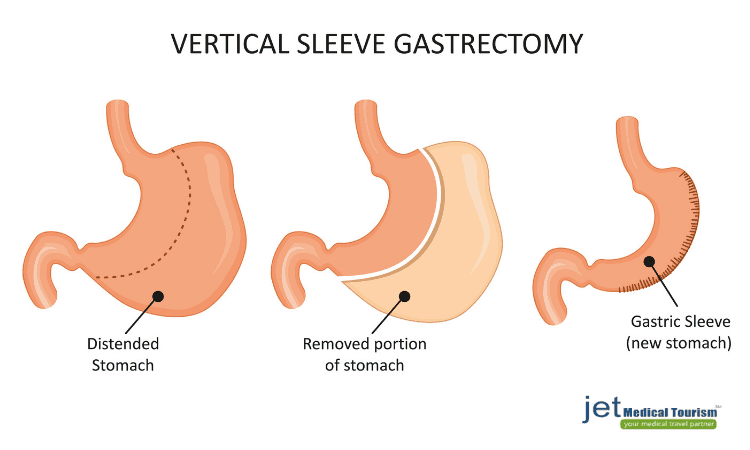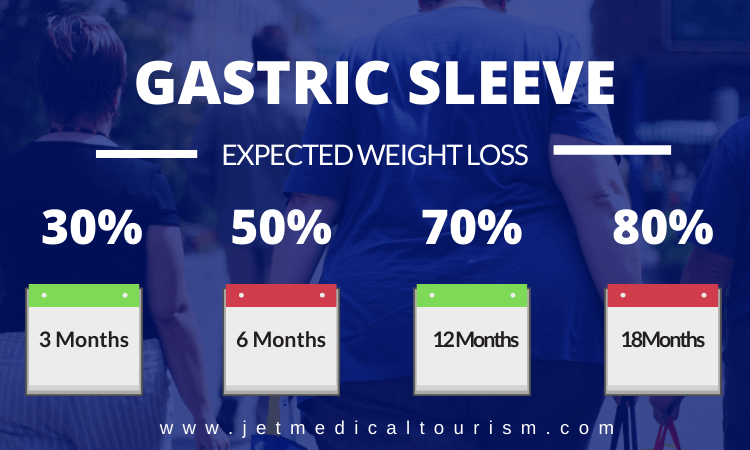Why Am I Not Losing Weight After Gastric Sleeve Surgery? Common Myth Debunked!
One of the common post-procedure concerns a bariatric patient may have is: “Why am I not losing weight after gastric sleeve surgery?” Patients may go through a low phase post-operatively if they had a poor understanding or misplaced expectations about how a weight loss surgery works.
An experienced bariatric surgeon will educate the patient during the initial consultation to help them make an informed decision. They will discuss how much weight loss after gastric sleeve could be achieved and share data regarding the average monthly weight loss after gastric sleeve.
Gastric sleeve weight loss can be very substantial in almost every case. But if the patient is unaware about the estimated timeline or fails to follow the post-op instructions of the surgeon, the results could be disappointing.
If the patient is worried about achieving little to no weight loss after gastric sleeve surgery, they should discuss the concern with their bariatric surgeon and nutritionist. In the rare case of a gastric sleeve weight loss failure, the surgeon may recommend a revision to gastric bypass surgery. A gastric bypass would involve rerouting of the small intestine to reduce calorie absorption. This could help the patient achieve their weight loss goals more successfully and on a sustainable level.
No weight loss after gastric sleeve: Myth or reality?
The biggest myth about not losing weight after gastric sleeve is that a massive weight loss will occur as soon as the surgery gets completed. Patients should understand that gastric sleeve weight loss is different from fat loss (which can occur instantly by way of liposuction).
Gastric sleeve surgery is designed to eliminate excess body weight in a safe and gradual manner, and not instantaneously. Patients should have realistic gastric sleeve weight loss expectations, especially with regard to the weight loss timeline.
Gastric sleeve expected weight loss typically begins to occur right after the procedure, but some patients may even report no weight 3 weeks after gastric sleeve.
As the patient recovers from the surgery, they will start feeling less hungry than before. Gastric sleeve weight loss will become more rapid with the passage of a few weeks and months as the surgery enables the patient to adopt healthier eating habits.
A reduced urge to eat following the surgery will serve as an effective solution to achieve safe, healthy and sustainable weight loss after gastric sleeve.
Related: Gastric sleeve surgery post op diet
Weight loss after gastric sleeve: All you need to know
Patients who are constantly worried about, “Why am I not losing weight after gastric sleeve,” or that gastric sleeve is not working should know that gastric sleeve surgery results are directly related to the change in dietary and lifestyle habits.

Sleeve gastrectomy is aimed at facilitating this process of healthy habits. During the procedure, the bariatric surgeon will remove a portion of the stomach to make it smaller (roughly the size of a banana).
When the size of the stomach is permanently reduced, it will naturally reduce the patient’s appetite. Their meal portions as well as frequency of meals will reduce.
Gastric sleeve surgery also induces healthy hormonal changes that further curb the appetite.
Based on this, patients who are concerned about not losing weight after gastric sleeve should understand the permanent healthy changes to their body and how it will help them naturally achieve massive weight loss.
Gastric sleeve expected weight loss
The expected weight loss after gastric sleeve will be in the range of 65 to 70 percent (of excess weight) within the first year. The average monthly weight loss after gastric sleeve is in the range of 8 to 12 pounds per month.
Timeline for gastric sleeve expected weight loss
| At 3 months | 25 to 30 percent excess weight loss |
| At 6 months | 45 to 50 percent excess weight loss |
| At 12 months | 65 to 70 percent excess weight loss |
| At 18 months | 70 to 80 percent excess weight loss |
Gastric sleeve weight loss expectations in the long-term can vary from one individual to another, depending on their personal commitment to a healthy lifestyle and balanced diet. However, on average, the expected weight loss after gastric sleeve in five to ten years is about 50 to 60 percent of the excess weight.
Patients should know that these are only ‘averages’, and on an individual basis, it is possible for a person to achieve far more dramatic results than the average patient. Stemming from this, while it’s necessary to maintain reasonable expectations, a patient should have ambitious gastric sleeve weight loss goals.
Related: Gastric sleeve before and after
Can you gain weight after gastric sleeve?
Yes, you can gain weight after gastric sleeve under certain conditions. Marginal weight fluctuations, temporary weight regain, and weight loss plateau are normal and expected events during your post-operative weight loss journey. Moreover, if weight regain appears to be progressive and irreversible, you should contact your bariatric surgeon for advice.
Percent of weight gain after gastric sleeve
Percent of weight gain after gastric sleeve can widely vary between patients. This will depend on the underlying cause as well as the time period after your VSG surgery when the weight regain occurs.
Research says that the percentage rate of weight gain in the long-term could vary from 5.7% at two years after surgery to 75.6% at six years.
Why am I gaining weight 3 weeks after gastric sleeve
Bariatric surgeons sometimes receive frantic calls from their patients who want to know: “Why am I gaining weight 3 weeks after gastric sleeve?” In most cases, weight regain at three weeks is not a cause for concern. Chances are you might have shed several pounds rapidly in the first three weeks, and thereafter your metabolic system may be taking a temporary break. But if the weight gain persists beyond a few days, it is important to investigate the underlying cause.
Common Reasons for Weight Loss Plateaus After Gastric Sleeve Surgery:
1. Dietary Issues
Your eating habits play a huge role in your post-surgery success. Even minor deviations can stall your weight loss.
- Not following the post-op diet: Advancing through dietary phases too quickly or eating non-approved foods can disrupt your weight loss.
- Liquid calories and slider foods: Consuming high-calorie drinks (like soda, alcohol, or sugary coffee) or soft foods like chips, crackers, and ice cream can sabotage your progress.
- Not tracking food intake: Grazing, emotional snacking, or underestimating calories can easily add up without you realizing it.
- Eating too fast or not chewing properly: This can lead to discomfort, poor digestion, and overeating.
2. Lifestyle Factors
Post-surgery success is not just about food — your daily habits matter just as much.
- Lack of physical activity: Skipping regular exercise can slow metabolism and limit fat loss.
- Poor hydration habits: Not drinking enough water or drinking during meals can affect hunger cues and digestion.
- Lack of accountability or support: Isolation and absence of follow-ups can make it harder to stay committed to long-term changes.
3. Metabolic and Hormonal Factors
Sometimes, internal changes in your body make weight loss more difficult, even when you’re doing everything right.
- Hormonal imbalances: Conditions like PCOS or menopause can slow progress.
- Insulin resistance or blood sugar issues: These affect how your body burns fat and stores energy.
- Slower metabolism: Natural metabolism decreases with age or extreme calorie restriction.
4. Underlying Medical Conditions
Certain health conditions or medications may interfere with your weight loss journey.
- Thyroid disorders (like hypothyroidism): An underactive thyroid can make it harder to lose weight.
- Medications that cause weight gain: Antidepressants, steroids, and some diabetes medications can counteract weight loss.
- Undiagnosed sleep apnea: Poor sleep and oxygen deprivation can disrupt hormones related to hunger and metabolism.
5. Stomach Pouch Changes
In rare cases, anatomical changes to your gastric sleeve may affect your results.
- Stretched or enlarged sleeve: Over time, the sleeve can stretch if not managed well, reducing restriction and increasing hunger.
- Surgical complications (rare): Issues like a twist or leak, while uncommon, can affect how well your sleeve functions.
Weight loss stall 6 months after gastric sleeve
In the first few months following your VSG, you may consistently lose several pounds of excess weight each month. But all of sudden, this exciting journey may hit a weight loss stall 6 months after gastric sleeve. But don’t let this temporary setback dampen your enthusiasm or detract you from your goal to eliminate obesity.
- A false alarm: In many cases, the weight loss plateau 6 months after gastric sleeve may not be real, and it could be just an aberration. You may have marginally slackened in adhering to a rigorous diet plan, or your body may be taking just a temporary metabolic break.
- Weight loss plateau: If you observe that the weight loss stall 6 months after gastric sleeve is persistent, it is time to take corrective measures. Make adjustments to your diet in consultation with your nutritionist, try some new exercises, and modify your lifestyle to disrupt the stall.
- Consult your surgeon: Despite your best efforts, if the weight loss stall 6 months after VSG does not reverse, you should consult your bariatric surgeon. They may order a few tests to investigate the cause and recommend solutions. In a rare case, you may need a revision surgery.
Related: Gastric sleeve regrets
Breaking Through a Weight Loss Plateau
If you’ve stopped losing weight after gastric sleeve, try these steps:
1. Revisit Your Surgeon or Dietitian
Have your labs checked and review your meal plan. Rule out mechanical issues like sleeve dilation.
2. Reset Your Pouch
Some patients benefit from a “pouch reset” or the 5-day pouch test — a short-term dietary approach to regain control over hunger and cravings.
3. Focus on Protein and Nutrient-Dense Foods
Prioritize lean proteins, fiber-rich vegetables, and healthy fats. Cut out sugar, simple carbs, and trigger foods.
4. Restart a Physical Activity Routine
Aim for 30 minutes of movement daily — even walking counts. Add resistance training over time.
5. Track Everything You Eat and Drink
Use apps like MyFitnessPal or BariatricPal to monitor calories, protein, and water intake.
6. Get Support
Join online bariatric communities or talk to Jet Medical Tourism’s patient support team. Accountability makes a big difference.
7. Talk to a Mental Health Professional
Address emotional eating, trauma, depression, or anxiety with a licensed therapist familiar with bariatric care.
How to be successful after gastric sleeve
Gastric sleeve surgery is aimed to aid your weight loss process, but it will not work without your personal commitment to achieve your ideal body weight. If you want to know how to be successful after gastric sleeve, here are a few proven tips that will help you beat the odds and emerge a winner with permanent freedom from obesity.
- Avoid empty calorie foods and beverages, and maintain a strong focus on a wholesome, nutrient-dense diet for consummate health.
- Prioritize lean proteins in your diet, and make it point to eat protein foods first in every meal. Choose even snacks which contain proteins.
- Plan every meal both scientifically and creatively to maintain a balanced diet, while still getting variety and taste for easy compliance.
- Drink plenty of water each day to stay well-hydrated, and continue to avoid sugary, carbonated, caffeinated and alcoholic beverages.
- Eat your meals in small portions, eat slowly, and chew thoroughly to make it easier on your digestive system, and to minimize nausea.
- Do not allow a sedentary lifestyle to thwart your plans of how to be successful after gastric sleeve, and follow a regular fitness regimen.
- Measure your calories in each meal, track your daily intake, and maintain a journal so that you don’t deviate from your goals.
- Be diligent about taking your daily supplements and vitamins as prescribed by your bariatric surgeon to promote good health.
- Get adequate sleep, learn to manage your stress levels, do yoga or meditation, and maintain a moderate and healthy lifestyle.
- Enlist emotional support from friends and family, participate in online or offline support groups, and maintain self-confidence.
- Maintain your follow-up appointments with your bariatric team and continue to adhere to their professional advice for best results.
Frequently Asked Questions (FAQs)
1. What happens if I don’t lose weight after gastric sleeve?
If you’re not losing weight after gastric sleeve surgery, it’s important to assess your diet, lifestyle, medical conditions, and whether your pouch is functioning as it should. The first step is to consult your bariatric surgeon or nutritionist to identify any underlying issues and develop a plan to get back on track. In some cases, revision surgery may be considered if all non-surgical options have failed.
2. Is it possible to have bariatric surgery and not lose weight?
Yes, while rare, some patients do not lose significant weight after bariatric surgery. This is often due to non-adherence to dietary guidelines, lack of physical activity, or metabolic/hormonal conditions that make weight loss more difficult. However, most patients will see at least some degree of weight loss if they follow medical and nutritional guidance consistently.
3. Can my gastric sleeve stop working?
Technically, the gastric sleeve doesn’t “stop working,” but it can become less effective over time due to poor habits, an enlarged pouch, or physiological adaptations. The sleeve is a tool — and how well it works depends on how you use it.
4. What should I do if I’m gaining weight after gastric sleeve surgery?
Start by logging your food intake, increasing your physical activity, and cutting back on processed or high-calorie foods. Schedule a visit with your bariatric care team to rule out physical issues like sleeve dilation or metabolic problems. Mental health support can also help address emotional or stress eating.
5. Can you revise a gastric sleeve if it’s not working?
Yes. If your sleeve has stretched or you’re not getting results despite significant effort, revision surgery (like converting to gastric bypass or re-sleeving) is an option. Your surgeon will assess your individual case to determine if you’re a candidate.
6. How do I know if my stomach pouch has stretched?
Common signs include increased hunger, ability to eat larger portions, and weight regain. Diagnostic tests like an upper GI series or endoscopy can help your surgeon evaluate the size and shape of your pouch.
Gastric sleeve results of Jet Medical Tourism’s patients
Choose Jet Medical Tourism® for Best Weight Loss Results with Gastric Sleeve!
At Jet Medical Tourism®, we regularly have patients who achieve significant excess weight loss after gastric sleeve surgery. If you are wondering whether gastric sleeve surgery is the right choice for you, give us a call today or contact us online to schedule a consultation.






